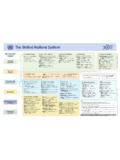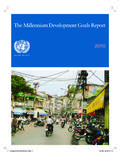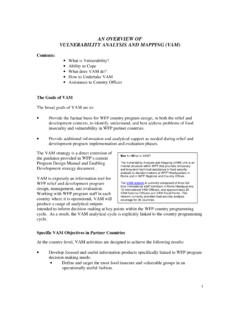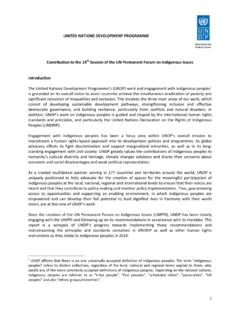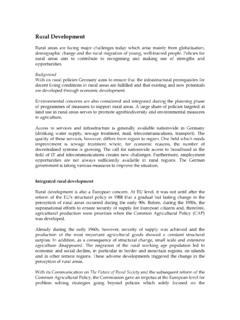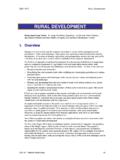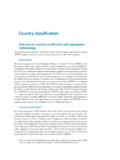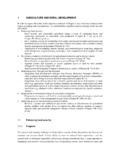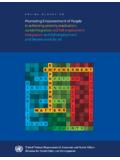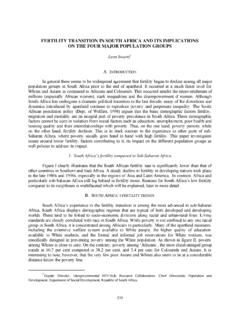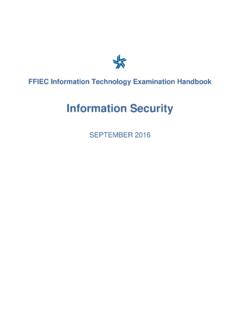Transcription of Global governance and governance of the global commons …
1 Global governance and governance of the Global commons in the Global partnership for development beyond 2015 Thematic Think Piece OHCHR, OHRLLS, UNDESA, UNEP, UNFPA The views expressed in this paper are those of the signing agencies and do not necessarily reflect the views of the United Nations. January 2013 2 Following on the outcome of the 2010 High-level Plenary Meeting of the General Assembly on the Millennium Development Goals, the United Nations Secretary-General established the UN System Task Team in September 2011 to support UN system-wide preparations for the post-2015 UN development agenda, in consultation with all stakeholders. The Task Team is led by the Department of Economic and Social Affairs and the United Nations Development Programme and brings together senior experts from over 60 UN entities and international organizations to provide system-wide support to the post-2015 consultation process, including analytical input, expertise and outreach.
2 3 Global governance and governance of the Global commons in the Global partnership for development beyond 2015 As the world becomes more interdependent, Global governance , including Global economic governance and the governance of the Global commons , is increasingly relevant for achieving sustainable development. Deepening economic globalization, and increasing migration, trade and capital flows, and climate change and increased activities in the Global commons those resource domains that do not fall within the jurisdiction of any one particular country, and to which all nations have access make individual States more susceptible to policies adopted by others. Therefore, increased coherence, coordination and collective decision-making at the Global level, grounded in international human rights standards and guided by the human rights commitments of the international community, are necessary.
3 Yet, government policies and international arrangements for collective decision making have not kept pace with these changes. The new Global partnership for development in the post-2015 development framework provides an opportunity to address these Global economic, social and environmental issues in a coordinated, coherent and collaborative manner. In this way, the Global partnership can promote a more effective, coherent, representative and accountable Global governance regime, which should ultimately translate into better national and regional governance , the realization of human rights and sustainable development. Global governance and sustainable development The transition to Global sustainable development has not been successful yet. Economic and social development has seen progress, but numerous challenges remain, while Global environmental problems have become even more acute.
4 Partly, this is because the increasing interdependence among States has not been accompanied by sufficient adjustments in the Global governance regime. 4 The sharp increase in trade and capital flows make Global economic governance increasingly relevant for development. However, gaps in the international trade, finance and technology regimes have reinforced rather than curbed Global imbalances. For example, bilateral, regional and multilateral trade agreements have eroded policy space for developing countries and pose hurdles to technology transfers, while financial market liberalization has increased their macroeconomic vulnerabilities without necessarily providing access to stable finance. Achieving a more enabling and inclusive system of Global economic governance will therefore be critical to overcoming these shortcomings and to enabling sustainable development.
5 Perhaps most importantly, inclusive economic governance entails having a strong and effective United Nations, the only truly universal and inclusive multilateral forum. Consideration should be given to proposals that enhance coordination, cooperation, coherence and policy-making across the United Nations In addition, efforts should also continue to further enhance the representation of developing countries in multilateral institutions and other norm- and standard setting bodies. Many of them remain marginalized or even excluded from Global decision-making processes, for instance within the Bretton Woods institutions or the G20, which therefore lack true representativeness and accountability. More engagement and coordination between the UN, informal country groupings like the G20, regional institutions and other established multilateral institutions is also needed.
6 Gaps in the Global governance regime also make further progress in social development more difficult. These include the absence of adequate mechanisms to regulate the movement of workers between countries, and weak protection of the rights of migrants and their families, as well as restricted access to technologies in health, agriculture and other areas. Environmental sustainability, the third dimension of sustainable development, is similarly characterized by a weak Global environmental governance regime that is very fragmented. There have been some 1 See S-G s report on Global Economic governance and Development , A/66/506, 10 October 2011 5 successes, such as the Brundtland Commission and the Earth Summit, along with other specific UN sponsored initiatives and summits that spurred environmental awareness and action in specific areas such as the Montreal Protocol on Substances that Deplete the Ozone Layer.
7 Many gaps remain however, and overall coherence is weak. The recent United Nations Conference on Sustainable Development, held in Rio de Janeiro in June 2012, allows envisaging a more coherent Global governance framework that is inclusive, centred on sustainable development, and integrates human rights concerns, addressing above shortcomings. This would involve conceptualizing an international policy-making framework, cutting across all organizations and decision-making entities, where the three dimensions of sustainable development (economic, social and environmental) are integrated in a coherent and balanced manner, while also strengthening political engagement and governance within each of the dimensions and governance pertaining to the financing of sustainable development.
8 Achieving these objectives would require a partnership at the Global level between all countries, multilateral organizations, civil society and other stakeholders. At the same time, putting in place an enabling and inclusive system of Global governance would create an international enabling environment and would thus strengthen the Global partnership for development in many ways, translating into a more coherent framework for achieving sustainable development at regional and national levels. governance of the Global commons The governance of the Global commons represents a specific aspect of Global environmental governance . Stewardship of the Global commons cannot be carried out without Global governance . Global commons have been traditionally defined as those parts of the planet that fall outside national jurisdictions and to which all nations have access.
9 International law identifies four Global commons , namely the High Seas, the Atmosphere, the Antarctica and the Outer Space. These resource domains are guided by the principle of the common heritage of mankind. Resources of interest or value to the welfare of the community of nations such as tropical rain forests and biodiversity - have lately been 6 included among the traditional set of Global commons as well, while some define the Global commons even more broadly, including science, education, information and peace. The implementation of the common heritage principle and common responsibilities relates directly to the four key enabling factors which have been identified as cornerstones of the Post-2015 development agenda: inclusive social development, inclusive economic development, environmental sustainability and peace and security .
10 Historically, access to most of the resources found within the Global commons has been difficult and they have not been scarce. However, the advancement of science and technology in recent years and the increased demand for resources is leading to an increase in activities such as fisheries, bioprospecting, navigation, flight, scientific research, and the laying of submarine cables. At the same time, our planet is facing critical environmental challenges, most importantly climate change and Global warming, the depletion of the Ozone layer, and rapid environmental degradation in the Antarctica. If business as usual prevails, these trends will likely worsen and will negatively impact the Global commons capacity to provide ecosystem services for human well-being.
